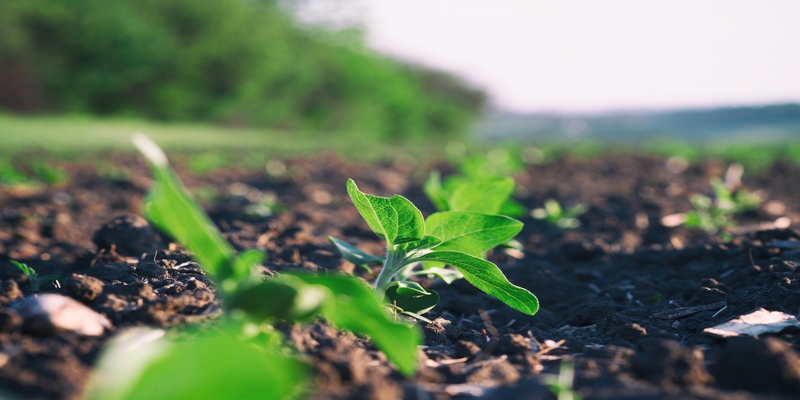World Soil Day: the benefits of organic farming
World Soil Day: the benefits of organic farming
* Giovanna Cappellano
With the aim of raising awareness of the importance of soil conservation, a natural resource essential to the sustainability of life on Earth, December 5th was established by the Food and Agriculture Organization of the United Nations (FAO) as World Soil Day.
One of the ways of soil conservation is through organic agriculture. Produced without synthetic pesticides, transgenics and chemical fertilizers, organic agriculture, in addition to influencing the quality of food and the health of those who consume it, also benefits the health of agricultural workers and the quality of soil, water, vegetation and local animals, as the process techniques respect the environment.
Learn about the six main benefits of organic farming:
1. Absence of pesticides: as synthetic pesticides are not used in organic agriculture, the productive ecosystem is healthier, from the soil to the food.
2. Quality of life in the countryside: organic crops generate employment and fair income for rural workers, as organic certification protects the basic rights of workers. So, organic agriculture contributes to improving the health and socioeconomic conditions of rural communities.
3. Soil conservation: unlike conventional agriculture, organic agriculture aims to conserve the soil through more sustainable practices. In this type of agriculture, everything is reused. It is possible, for example, to fertilize or protect against pests with plant parts. In conventional agriculture, these parts would be discarded or even burned. This process allows the maintenance of the health of the soil and the entire ecosystem involved for a more efficient and less aggressive production.
4. Animal welfare: in organic production, animals are fed only with organic products and kept in larger and less stressful places, reducing the use of artificial hormones and synthetic antibiotics. With healthier animals and plant-based feeding, it is possible to use excrements as fertilizer. In this way, there is a reduction in waste and the cycle is closed.
5. Promotion of biodiversity: soil conservation and the absence of pesticides help to preserve birds, insects, animals, as well as fungi and bacteria present in the soil, which are important for the growth of vegetation in the region and for the maintenance of ecosystems.
6. Carbon capture: the conservation of soil health contributes to the carbon sequestered by plants being trapped in the soil. As carbon dioxide is removed from the atmosphere, the environmental impact is minimized.
How Concepta Ingredients promotes the adoption of organic and sustainable agricultural practices
Concepta Ingredients, Sabará Group business unit, has been working for years to deliver organic and sustainable products with the guarantee of the traceability, health, texture and flavor, which can add value for customers, suppliers, communities, employees and shareholders and, thus, encourage that other companies also participate in actions that flow towards sustainable and responsible progress. In addition, its production chain aligned with the values defended by the UN, especially in relation to the Sustainable Development Goals (SDG), 15 (Life on Land) and 12 (Responsible Consumption and Production).
Concepta's portfolio of organic and exotic ingredients includes 12 products, of which 66.66% have BR (Brazil) organic certification and 83.33% have EOS (European Union) and NOP (United States) organic certification. The list of products considered is: Licuri (oil), Babaçu (oil), Passion fruit (oil), Patauá (oil), Cupuaçu (butter), Brazil Nut (oil), Coco (oil), Sancha Ichi (oil) and , recently, the Açaí (oil, extract, powder and syrup).
The launch of the Açaí Extract and Syrup contribute directly to socioeconomic development in the Amazon and indirectly impact around 5,072 families who live from the cultivation of açaí collection, which produces four açaí products (extract, syrup, powder and oil). They operate in 1610 hectares of conserved area, with 1,079,430 hectares of organic conservation area.
Furthermore, the Sabará Group is recognized worldwide for its Sociobiodiversity Enhancement Program®️, created in 2000, which guarantees the complete traceability of raw materials from the Amazon Forest, Cerrado and Caatinga. The project focuses on engaging communities, cooperatives and associations that supply biodiversity inputs through initiatives on four pillars: balanced human development, water and biodiversity conservation, ethics and transparency, and adequate profitability, promoting respect, dignity and socioeconomic inclusion.
The results obtained are:
● + 1.9 million organic hectares conserved indirectly through the valorization of non-timber forest products;
● + 6,000 rural workers, including quilombola and indigenous communities, potentially engaged in Concepta's supply chain;
● 227 hectares of certified organic native forest by direct incentive from Concepta, which represent around 256 soccer fields in a preserved area;
● +27 thousand people indirectly impacted by this relationship;
● R$7.5 thousand in average extra income per ton per family per year.
* Giovanna Cappellano is the coordinator of the ESG area of Sabará Group, a company with 65 years of history that offers sustainable technologies, solutions and high-performance raw materials for the water treatment, food and beverage, nutrition and animal health markets .
About Grupo Sabará
The Sabará Group, with over 65 years of history, is genuinely Brazilian and recognized for its capacity for innovation and adaptation. For three generations, the Group has overcome challenges and stands out in its operating markets. Its commitment to the well-being of people around the world goes beyond offering innovative products and services. Its activities take into account future generations, focusing on solutions that ensure sustainability.
Through its various branches of activity, the Sabará Group operates nationwide and is present in countries in South America, North America and Europe.
It specializes in the development of high-performance technologies, solutions and raw materials, aimed at the water treatment markets in the sanitation and industry, animal nutrition and health, and the food and beverage industries.
The development of its products relies on 100% national knowledge and technology, a factor that contributes to Brazil becoming a reference in product research in favor of a sustainable world.


